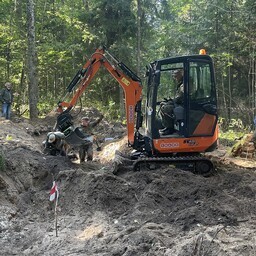Narva-Jõesuus kaevavad välja Saksa sõdurite luud
.
Need sõdurid surid sõjas
. Nad tahavad neid uuesti matta.
Narva-Jõesuus kaevavad välja Saksa sõdurite luud
Tõlge fraasile: Narva-Jõesuus kaevavad välja Saksa sõdurite luud
EN
In Narva-Jõesuu, they are excavating the bones of German soldiers
Need sõdurid surid sõjas
Tõlge fraasile: Need sõdurid surid sõjas
EN
These soldiers died in the war
Esimese kolme päevaga leiti 40 sõduri luud
.
Enamik olid meresõdurid
.
Maa on liivane, mis aitab luude kaevamisel
.
Tööd pole veel lõppenud
.
Arvatakse, et seal on veel 80 sõdurit
.
Esimese kolme päevaga leiti 40 sõduri luud
Tõlge fraasile: Esimese kolme päevaga leiti 40 sõduri luud
EN
In the first three days, the bones of 40 soldiers were found
Enamik olid meresõdurid
Tõlge fraasile: Enamik olid meresõdurid
EN
Most were navy soldiers
Maa on liivane, mis aitab luude kaevamisel
Tõlge fraasile: Maa on liivane, mis aitab luude kaevamisel
EN
The ground is sandy, which helps with excavating the bones
Tööd pole veel lõppenud
Tõlge fraasile: Tööd pole veel lõppenud
EN
The work is not yet finished
Arvatakse, et seal on veel 80 sõdurit
Tõlge fraasile: Arvatakse, et seal on veel 80 sõdurit
EN
It is believed that there are still 80 soldiers there
Otsinguklubi juht ütleb, et tööd on tähtsad. Saksa organisatsiooni esindaja ütleb, et sõda toob palju valu.
Sõda algas 1939. aastal
.
Paljud sakslased surid Eestis ja Euroopas
.
Sõda algas 1939. aastal
Tõlge fraasile: Sõda algas 1939. aastal
EN
The war began in 1939
Paljud sakslased surid Eestis ja Euroopas
Tõlge fraasile: Paljud sakslased surid Eestis ja Euroopas
EN
Many Germans died in Estonia and Europe
Esindaja ütleb, et sõjas pole midagi head. Nad alustasid tööd Eestis 1996. aastal. Sellest ajast on nad uuesti matnud 12 500 sõdurit.
Leitud luud matavad nad järgmisel aastal Narva kalmistule
.
Leitud luud matavad nad järgmisel aastal Narva kalmistule
Tõlge fraasile: Leitud luud matavad nad järgmisel aastal Narva kalmistule
EN
The found bones will be buried next year at the Narva cemetery
In Narva-Jõesuu, they are excavating the bones of German soldiers. These soldiers died in the war. They want to rebury them.
In the first three days, the remains of 40 soldiers were found. Most were sailors. The soil is sandy, which helps in excavating the bones. The work is not yet finished. It is estimated that there are still 80 soldiers there.
The leader of the search club says the work is important. A representative of the German organization says war brings much pain. The war began in 1939. Many Germans died in Estonia and Europe.
The representative says there is nothing good in war. They started their work in Estonia in 1996. Since then, they have reburied 12,500 soldiers.
The found remains will be buried next year at the Narva cemetery.

